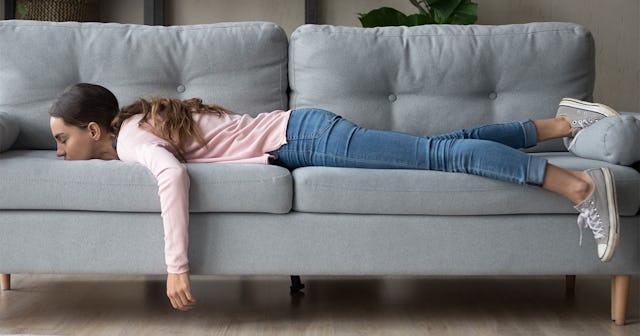Why Too Much Free Time Can Be As Bad For You As Having Too Little

I have this fantasy lately. No, it’s not that kind of fantasy; this one consists of one thing and one thing only – free time. Lots and lots of free time. No meetings. No picking kids up and dropping kids off only to turn around up pick kids up again. No deadlines. No committees. And FFS, no Zoom calls. Just free time. Loads and loads of free time. Free time that stretches for as far as the eye can see.
Except as I’m often reminded, this really is just a fantasy. At least for the foreseeable future. And it turns out, a new study shows that endless mountain of free time might not be the Eden-like existence that I make it out to be.
The Washington Post recently reported that, according to study results published earlier this month in the Journal of Personality and Social Psychology, our wellbeing does increase in correlation with our free time, but only to a certain point. Turns out, there’s a Goldilocks component to free time – too little isn’t healthy but too much isn’t good for us either.
Moderation is key, as with everything. “What we found is that a moderate amount of free time or discretionary time is kind of the sweet spot that people are happiest with,” study author Marissa Sharif, an assistant professor of marketing at the Wharton School at the University of Pennsylvania, told the Washington Post.
In addition to looking at data collected from more than 13,000 employed Americans, asking them about how much free time they had and their overall sense of wellbeing, researchers also recruited about 6,000 people who were assigned to imagine different amounts of free time during the day and report how they would feel in these scenarios. Participants in the second experiment were also asked to imagine free time spent on “productive” activities like exercising or a hobby or “unproductive” activities like watching tv or scrolling social media.
Researchers found that too much free time was just as harmful to wellbeing as too little, but they found that “productive activities” helped participants feel better about having an excess of time.
Although the researchers didn’t specify a sweet spot of free time each day, in general it ranged from 2-5 hours. There was one big exception to the researchers’ findings, however. When participants with large amounts of extra time spent that time with others or doing something they considered meaningful, they didn’t experience a decrease in their wellbeing.
In other words, it isn’t necessarily the free time that’s the problem, but how we fill it. Bingeing on Netflix is fun for only so long, after that we need more to sustain us. Downtime that feels “lazy” can be less satisfying and good for us than time we use to create connections with others or contribute to the world in a meaningful way.
It’s important to note that this study only looked at Americans, and it’s no secret that we are a workaholic country that values working long hours – oftentimes at extreme and even toxic levels. Study author Cassie Mogilner Holmes, PhD, professor of marketing and behavioral decision making at the UCLA Anderson School of Management, said she wouldn’t expect a significant difference from a purely psychological perspective, she does think the context might affect the details and the amount of free time that is deemed too much or too little.
I’ll be honest, there are plenty of days when I want to quit everything and move to a cabin in the woods. Maybe even somewhere on the other side of the world where time zone differences will keep the obligations at bay. Except I don’t really want this. I would be bored in a hot minute. And pretty lonely too.
So what is it I actually want when I fantasize about all that extra time? I think what I really want – and maybe it’s what you want too – is a little room to breathe. But even more than that, I want to feel like it’s okay to breathe.
Because whenever I do find myself with a chunk of that elusive “free time,” I end up spending most of the time stressing about “should.” I should organize the basement. I should journal or do yoga. I should clean the garage. I should take a walk or bake a loaf of bread. I should do something productive, for heaven’s sake.
I also know that whenever I have too much free time and too little structure in how I spend it, I am paralyzed by an overwhelming dread that I am somehow wasting this precious commodity of time. I fight off pangs of indecision and guilt, which of course turns this so-called free time into a source of stress.
As the study authors say, moderation is indeed key. But maybe that other catchphrase of “quality over quantity” matters when it comes to free time too.